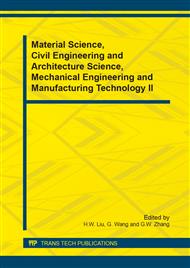[1]
Jiawei. Han, Micheline Kamber. Fan Ming, Meng Xiaofeng, et al (2001), trans. Data Mining Concepts and Technique [M]. Beijing: Engineering Industry.
Google Scholar
[2]
Jiang Zhuojun, Xie Kanglin, Zhang Wenjie (2002). A New Association Rule Mining Thought [J]. Computer Engineering, 28(4): 88-90.
Google Scholar
[3]
Cheng Jihua, Shi Pengfei (1998). Effective Mining Algorithm of Multilevel Association Rule [J]. Journal of Software, 9(12): 937-941.
Google Scholar
[4]
Goldberg D, Niehols D, Oki B. M, Terry, D (2004). Using Collaborative Filtering to Weave an Information Tapestry [J]. Communications of the ACM.
DOI: 10.1145/138859.138867
Google Scholar
[5]
Konstan, J. A. Miller, B. N. Maltz, D. Herloek, J. L. Gordon, L. R. and Riedl, J (2008). Group Lens: Applying Collaborative Filtering to Usenet News[J]. Communications of the ACM.
DOI: 10.1145/245108.245126
Google Scholar
[6]
Resnick, P. Lacovou, N. Suehak, M. Bergstrom, P. and Riedl, J (2005). Group Lens: An Open Architecture for Collaborative Filtering of Netnews. In Proceedings of ACM CSCW'94 Conference on Computer-Supported Cooperative Work.
DOI: 10.1145/192844.192905
Google Scholar
[7]
Shardanand U, Maes P (1995). Social Information Filtering: Algorithms for Automating Word of Mouth". In Proceedings of the ACM CHI, 95 Conference on Human Factors in Computing Systems. 210-217.
DOI: 10.1145/223904.223931
Google Scholar
[8]
Hill W, Stead L, Rosenstein M (2003), Fumas G Recommending and Evaluating Choices in a Virtual Community of Use. In Proceedings of the CHI'95. 194-201.
DOI: 10.1145/223904.223929
Google Scholar
[9]
Breese J, Hecherman D, Kadie C (1998). Empirical Analysis of Predictive Algorithms for Collaborative Filtering. In Proceedings of the 14th Conference on Uncertainty in Artificial Intelligence (UAI'98). 43-52.
Google Scholar
[10]
Wolf J, Agarwal C, Wu K-L, Yu P (1999). Horting Hatches an Egg: A New Graph-approach to Collaborative Filtering. In Proceedings of the ACM SIGMOD International Conference on Knowledge Discovery and Data Mining. San Diego, 20-1212.
DOI: 10.1145/312129.312230
Google Scholar
[11]
Fu X. Budzik J. Hammond K J (2000). Mining Navigation History for Recommendation [A]. Proceedings of the 2000 Interfaces[C]. New York: USA: ACM Press. 106-112.
Google Scholar


